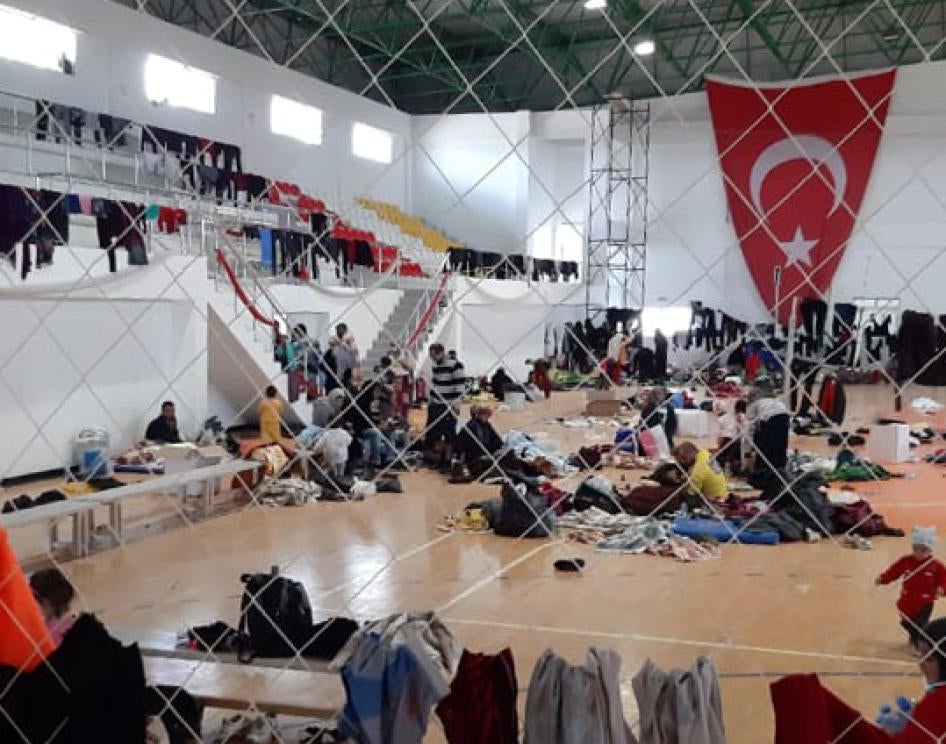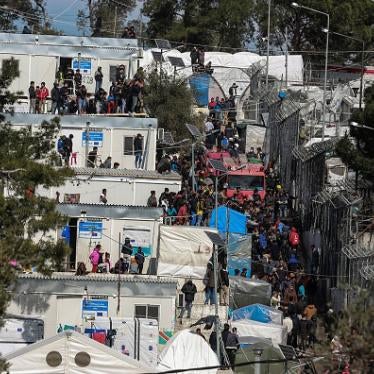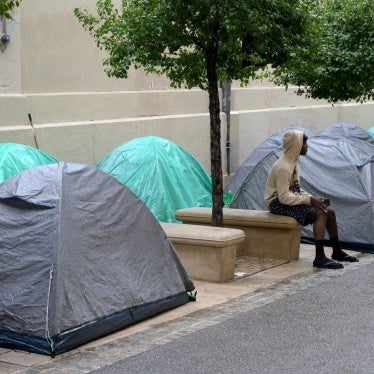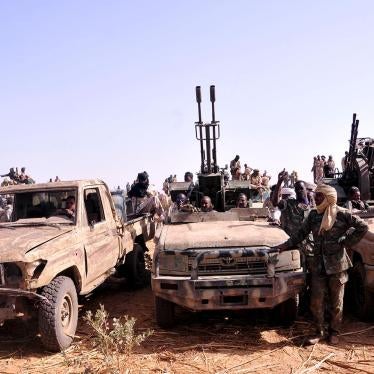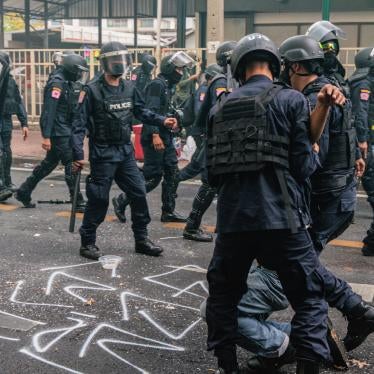(Beirut) – Turkish Cypriot authorities should immediately release 175 detained Syrian asylum seekers, and Greek Cypriot authorities should allow them to cross the line into their territory and process their asylum claims, Human Rights Watch said today.
On March 20, 2020, citing a Covid-19 lockdown, Greek Cypriot authorities refused permission to dock to a boat carrying the asylum seekers, many of whom were trying to join family already settled in the Republic of Cyprus. The boat eventually navigated north, and Turkish Cypriot authorities rescued them from shallow waters when their vessel capsized. Turkish Cypriot authorities are now effectively detaining the asylum seekers and have indicated that they will transfer them to Turkey.
“Turkish Cypriot authorities initially provided rescue and safety to the Syrian asylum seekers, but now appear to be holding them in indefinite detention,” said Nadia Hardman, refugee and migrant rights researcher at Human Rights Watch. “For their part, Greek Cypriot authorities should not ignore the claims for protection and family reunification that many of the asylum seekers have on its territory.”
The 175 Syrian asylum seekers, most of whom fled Aleppo and Idlib, left Mersin in southern Turkey on a boat bound for Cyprus on March 20. They include 69 children, at least 7 of them unaccompanied. After the Greek Cypriot coast guard pushed them back, the overcrowded boat traveled north and overturned near the Northern Cyprus shore. No one was injured and the Turkish Cypriot authorities helped the Syrians reach land and gave them relief items.
The authorities housed the asylum seekers in a sports hall for a few days, then moved them to an apartment complex for a 14-day quarantine period. That period ended in the first week of April, but the Turkish Cypriot authorities have maintained the Syrian asylum seekers under effective house arrest, confined to the apartments and under constant surveillance. The legal basis for their continued confinement is unclear, as under the law in Northern Cyprus, detention on migration grounds is authorized only for 8 days, extendable only by a court decision, which Human Rights Watch understands has not been sought in this case.
As a matter of international law, the Republic of Cyprus refers to the entire island, but it is currently under the effective control of two states. The internationally recognized government of the Republic of Cyprus has effective control over the southern part – also referred to as Greek Cyprus. It is a European Union member. The self-declared Turkish Republic of Northern Cyprus (TRNC) governs the northern part and is deemed to be under the effective control of Turkey, the only country that recognizes the entity of TRNC. Under international law, Turkey is treated as an occupying power and assumes responsibility for upholding human rights there.
Human Rights Watch spoke with 2 of the asylum seekers, who described their conditions as cramped, with 15 to 21 people on average to a room. “They don’t let us outside,” one said. “We are not even allowed on the balcony. We spend all day in our rooms. We don’t know anything and don’t know what will happen to us.” Human Rights Watch understands that the asylum seekers have access to a nurse but have not been tested for Covid-19.
The TRNC issued deportation orders from the territory to Turkey for all 175 asylum seekers. Human Rights Watch understands that Turkey has refused to accept the Syrians, citing Covid-19-related concerns.
Turkey has repeatedly violated the prohibition on refoulement – the forcible return of refugees or asylum seekers to a country where they are liable to face persecution or serious violations of their rights, Human Rights Watch said. Since July 2019, Turkey has deported hundreds of Syrians, perhaps more. Any Syrians forcibly returned to Turkey face a risk of onward refoulement to Syria.
Human Rights Watch spoke to three Syrian asylum seekers in the Republic of Cyprus who said that on previous attempts to reach Cyprus in the past year they had been interdicted by the Turkish coast guard and ultimately returned to Syria. In all cases, they were forced to sign voluntary repatriation forms, a practice that Human Rights Watch has documented.
The asylum seekers trapped in northern Cyprus expressed frustration and said they were afraid of being returned to Syria. Three had tried to escape by jumping from the balcony of their apartment building but were caught, uninjured, and returned to their rooms. While Turkey has refused to accept them, Human Rights Watch is concerned that this position could change once the strict restrictions on freedom of movement because of Covid-19 loosen.
The Turkish-controlled TRNC does not operate its own asylum system. The protections that Cyprus is required to provide to asylum seekers as an EU member are inaccessible for asylum seekers in the north. Instead, nongovernmental groups in Northern Cyprus are sometimes granted access to migrants who arrive there to find out if they have international protection needs. If the groups determine that they do, the authorities have tended to allow them to stay and granted them access to basic rights such as to health care, education, and work. Human Rights Watch understands that the groups have yet to be granted access to the 175 asylum seekers.
The Republic of Cyprus is entitled to control its borders and manage crossings into the country but is bound by the EU Charter of Fundamental Rights to respect the right to seek asylum. Failure to do so may also violate the nonrefoulement principle. Failure to assist a boat in distress could also be a breach of international law of the sea and EU obligations on search-and-rescue.
Under international law, public health measures must be proportionate, nondiscriminatory, and based on available scientific evidence. Measures such as requiring a period of isolation or quarantine may be permitted, but the pandemic cannot justify blanket bans on allowing boats to land, which risk the rights to life and health of those on board.
Turkish authorities, as well as the TRNC, are bound by the principle of nonrefoulement. They are also bound by international human rights law, including the European Convention on Human Rights, which prohibits arbitrary detention. While irregular migrants may be detained for limited periods, including pending lawful removal, if such removal is unable to be carried out imminently, they should be released.
States should not detain children for immigration-related reasons and are obliged to provide appropriate care to unaccompanied children. On April 13, UNICEF said that all governments should impose a moratorium on detaining children and urgently release children where alternatives are possible, due to heightened risks of Covid-19 in detention.
The Turkish Cypriot authorities should end the detention of the Syrian asylum seekers and ensure they are housed in accommodation where they are able to practice social distancing and proper hygiene and have access to adequate food, water, medical care, and legal assistance, Human Rights Watch said.
“The Syrian asylum seekers are being held in cramped quarters, vulnerable to the spread of Covid-19, in constant fear they may be forcibly returned to the country they fled,” Hardman said. “Once released from detention, the Republic of Cyprus should promptly accept their claims for asylum and requests for family reunification and protect them from the risk of return to persecution or other serious violations in Syria.”
